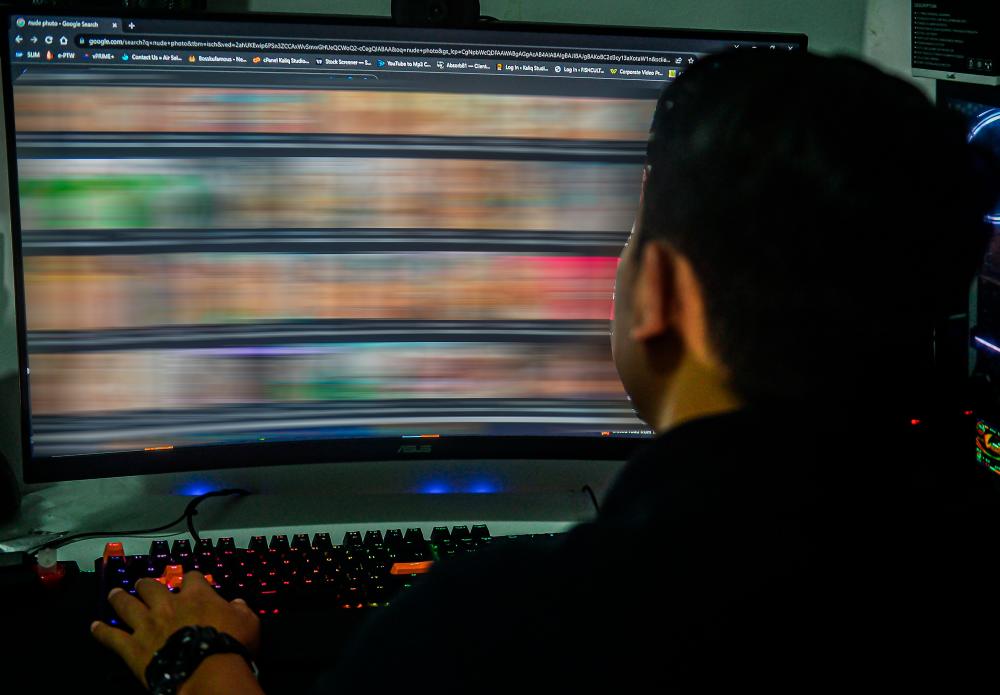PETALING JAYA: Teenagers in Malaysia are accessing pornography due to poor legislation, says NGO Malaysians Against Pornography president Dr Fatimah Ahmad Fauzi.
She was commenting on research conducted by UKM Faculty of Medicine, Family Medicine Department Assoc Prof Dr Noor Azimah Muhammad, who said in 2021 alone, some 75% of Malaysian teenagers aged between 13 and 18 watched pornography.
“Internet service providers in Malaysia don’t have to block or report inappropriate content related to child sexual abuse or sexual content,” said Fatimah.
“Plus, Malaysian Communications and Multimedia Commission’s (MCMC) directives are limited because they can only block access via domain name systems or IP addresses, which can be easily bypassed.
“Additionally, despite having the technical apparatus, police face difficulty in gaining full access to IP addresses due to restrictions under the Data Protection Act.”
Fatimah stressed that owning any form of pornographic material is illegal under Section 292 of the Penal Code.
In so far as MCMC’s content code is concerned, any portrayal of sexual activity that a reasonable adult considers explicit and pornographic is prohibited.
“This means that any action linked to pornography is unethical, immoral and even criminal. But teenagers continue to watch pornography despite this.”
She said among the reasons for their addiction to it are loneliness, curiosity and even stress relief.
“It can also be due to external factors such as peer influence and the fear of missing out. Besides, pornography is easily accessible through online sources.”
Fatimah said parental negligence is also a key factor, according to a 1999 study by psychiatrist-authors Elissa P. Benedek and Catherine F. Brown.
The study stated that teenagers who grow up in single-parent homes were particularly at risk of pornographic obsession, “especially when the television is used as a babysitter”.
She said pornography is a major global concern and in Malaysia, pornographic materials can be easily accessed from the internet.
“We also have manpower shortage and insufficient staff with digital forensic training, including in filtering and tracking IP addresses.
“This is another reason pornography sites can still be accessed by the public today.”
Psychologist Dr Lavanya Pillai said watching pornography as a teenager can lead to distorted views about sex.
“It can result in unrealistic expectations, dissatisfaction and anxiety in real-life sexual experiences. Additionally, it may lead to addiction, disruption of daily life and cause distress.
“Watching pornography can also have physical effects, which can lead to desensitisation, affect arousal and sexual performance, and potentially lead to compulsive sexual behaviours,” she said.
Lavanya warned that watching pornography impacts future relationships by distorting one’s grasp of intimacy, consent and sexual conduct.
She said it may also lead to dependence on explicit material for sexual satisfaction, affecting long-term sexual health and overall well-being.
“Pornography can significantly influence a teenager’s perception of gender roles and stereotypes. It often portrays men as dominant and women as submissive. This reinforces traditional and often harmful gender roles.
“It can also depict women as objects of desire rather than as equals, which can skew a teenager’s understanding of consent, respect and equality in relationships.”
Lavanya stressed that it is crucial to counter these messages with open conversations about gender equality and respect in relationships.
“Teenagers need comprehensive sex education and open discussions about these effects to develop a healthier, more realistic view of sex and relationships,” she said.










